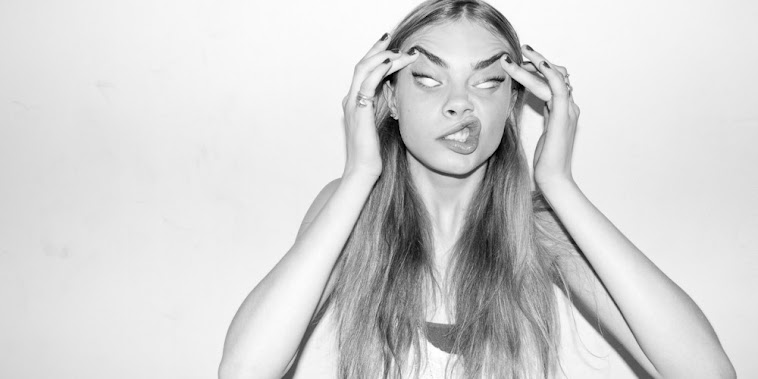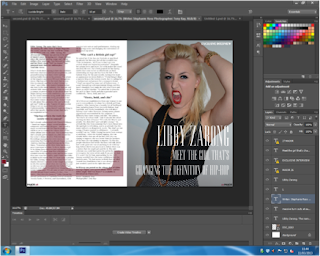To the examiner,
I hope you enjoy looking through my blog and at the work that I have produced across the course. All my research and planning has been carried out with great effort and detail and I hope that this shows throughout my blog and final product. To make my posts easier to browse, I have labeled every one appropriately and have noted the source of information that I have gathered inspiration from in each individual one. Overall, I hope you enjoy looking through my blog as much as I have enjoyed the course, thank you.
AS Media Coursework

Tuesday, 30 April 2013
Monday, 29 April 2013
Monday, 15 April 2013
Friday, 12 April 2013
Final Evaluation Question 6
What have you learnt about the technologies from the process of constructing this product?
 Camera:
Camera:
To take my photos I used a Nikon D3100. The high ability of this camera allowed my shots to be of a high quality and of a sharp, concise colour. The flash allowed an automated reaction to the lighting equipment to also ensure a high quality image was produced. The blank background allowed the image to be clearly isolated - all contributing to the overall quality and professional style of the shots. I learnt that using a high quality megapixel camera enhanced, not only the images, but the whole appearance of the magazine and played a huge factor in the professional look of the magazine itself. Images were also easier to take in fast sequences, which enabled me to capture shots of the model that look natural and not forced.
 Computer/MacBook:
Computer/MacBook:
I used the school computers and a MacBook Pro to create my coursework. I used these for researching my target audience, music genre, and magazine stylisation. I didn't learn anything new about these machines during the task, however I did learn significant amount about the programs that I have used on these computers.
Photoshop elements:
 The main platform that I used to construct my product was Adobe Photoshop CS6. Techniques I used that were implemented in my work included the use of new tools such as fading the colour of a text to create a translucent effect, used for the 'L' beneath my article on my double page spread, to create a more interesting design. I learnt new techniques from YouTube tutorials, which demonstrated step-by-step guides.
The main platform that I used to construct my product was Adobe Photoshop CS6. Techniques I used that were implemented in my work included the use of new tools such as fading the colour of a text to create a translucent effect, used for the 'L' beneath my article on my double page spread, to create a more interesting design. I learnt new techniques from YouTube tutorials, which demonstrated step-by-step guides.
Blogger:
I documented all stages of my coursework processes on Blogger - I posted each stage of research, drafting, final pieces and evaluation. This is my first blog that I have frequently posted on and I have learnt how to use it effectively during the course.
Animoto:
Animoto is a platform that helped me create a video for my initial pitch that allowed me to add music, photographs, and words altogether to emphasise my magazine idea. This was embedded into my blog and also played in front of an audience and helped me represent my magazine genre and style more effectively.
Flickr:
I used Flickr after I had taken images from two different shoots with my model. This online platform allowed me to create sets for each shoot, which then were shared onto my blog for easy and quick viewing. This also allowed me to browse through my photos and highlight/select the appropriate images that I was planning to use in my magazine.
Microsoft Word 2007
 I also used Microsoft Word 2007 to construct the text to my article and contents before inserting it into my PSD. This helped me as it meant I had a secure version of the article and I could edit the layout straight away using the grid on Photoshop to achieve an equal distribution of text. I learnt that by forming my article first it was then easily transferred onto Photoshop and I knew which column proportion and amount of text would be needed in each space on the grid. Spell check was also useful on Microsoft as it ensured that my article read well and was professional with no spelling errors.
I also used Microsoft Word 2007 to construct the text to my article and contents before inserting it into my PSD. This helped me as it meant I had a secure version of the article and I could edit the layout straight away using the grid on Photoshop to achieve an equal distribution of text. I learnt that by forming my article first it was then easily transferred onto Photoshop and I knew which column proportion and amount of text would be needed in each space on the grid. Spell check was also useful on Microsoft as it ensured that my article read well and was professional with no spelling errors.
 Camera:
Camera:To take my photos I used a Nikon D3100. The high ability of this camera allowed my shots to be of a high quality and of a sharp, concise colour. The flash allowed an automated reaction to the lighting equipment to also ensure a high quality image was produced. The blank background allowed the image to be clearly isolated - all contributing to the overall quality and professional style of the shots. I learnt that using a high quality megapixel camera enhanced, not only the images, but the whole appearance of the magazine and played a huge factor in the professional look of the magazine itself. Images were also easier to take in fast sequences, which enabled me to capture shots of the model that look natural and not forced.
 Computer/MacBook:
Computer/MacBook:I used the school computers and a MacBook Pro to create my coursework. I used these for researching my target audience, music genre, and magazine stylisation. I didn't learn anything new about these machines during the task, however I did learn significant amount about the programs that I have used on these computers.
Photoshop elements:
 The main platform that I used to construct my product was Adobe Photoshop CS6. Techniques I used that were implemented in my work included the use of new tools such as fading the colour of a text to create a translucent effect, used for the 'L' beneath my article on my double page spread, to create a more interesting design. I learnt new techniques from YouTube tutorials, which demonstrated step-by-step guides.
The main platform that I used to construct my product was Adobe Photoshop CS6. Techniques I used that were implemented in my work included the use of new tools such as fading the colour of a text to create a translucent effect, used for the 'L' beneath my article on my double page spread, to create a more interesting design. I learnt new techniques from YouTube tutorials, which demonstrated step-by-step guides. Blogger:
I documented all stages of my coursework processes on Blogger - I posted each stage of research, drafting, final pieces and evaluation. This is my first blog that I have frequently posted on and I have learnt how to use it effectively during the course.
Animoto:
Animoto is a platform that helped me create a video for my initial pitch that allowed me to add music, photographs, and words altogether to emphasise my magazine idea. This was embedded into my blog and also played in front of an audience and helped me represent my magazine genre and style more effectively.
Flickr:
I used Flickr after I had taken images from two different shoots with my model. This online platform allowed me to create sets for each shoot, which then were shared onto my blog for easy and quick viewing. This also allowed me to browse through my photos and highlight/select the appropriate images that I was planning to use in my magazine.
Microsoft Word 2007
 I also used Microsoft Word 2007 to construct the text to my article and contents before inserting it into my PSD. This helped me as it meant I had a secure version of the article and I could edit the layout straight away using the grid on Photoshop to achieve an equal distribution of text. I learnt that by forming my article first it was then easily transferred onto Photoshop and I knew which column proportion and amount of text would be needed in each space on the grid. Spell check was also useful on Microsoft as it ensured that my article read well and was professional with no spelling errors.
I also used Microsoft Word 2007 to construct the text to my article and contents before inserting it into my PSD. This helped me as it meant I had a secure version of the article and I could edit the layout straight away using the grid on Photoshop to achieve an equal distribution of text. I learnt that by forming my article first it was then easily transferred onto Photoshop and I knew which column proportion and amount of text would be needed in each space on the grid. Spell check was also useful on Microsoft as it ensured that my article read well and was professional with no spelling errors.
Final Evaluation Question 4
Try our slideshow creator at Animoto.
Subscribe to:
Comments (Atom)




